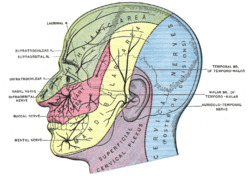Infratrochlear nerve
The infratrochlear nerve is a branch of the nasociliary nerve (itself a branch of the ophthalmic nerve (CN V1)) in the orbit. It exits the orbit inferior to the trochlea of superior oblique. It provides sensory innervation to structures of the orbit and skin of adjacent structures.[1]: 631, 783
| Infratrochlear nerve | |
|---|---|
 Sensory innervation of the head. The infratrochlear nerve is seen in the green area, emerging from the orbit. | |
| Details | |
| From | Nasociliary nerve |
| Innervates | Skin of eyelids, conjunctiva, lacrimal sac, lacrimal caruncle, side of nose above medial canthus |
| Identifiers | |
| Latin | nervus infratrochlearis |
| TA98 | A14.2.01.035 |
| TA2 | 6214 |
| FMA | 52693 |
| Anatomical terms of neuroanatomy | |
Structure
[edit]The nasociliary nerve terminates by bifurcating into the infratrochlear and the anterior ethmoidal nerves. The infratrochlear nerve travels anteriorly in the orbit along the upper border of the medial rectus muscle and underneath the trochlea of the superior oblique muscle. It exits the orbit medially and divides into small sensory branches.[2][verification needed]
Distribution
[edit]The infratrochlear nerve provides sensory innervation to the skin of the eyelids, the conjunctiva, lacrimal sac, lacrimal caruncle, and the side of the nose superior to the medial canthus.[1]: 631, 783
Communications
[edit]The infratrochlear nerve receives a descending communicating branch from the supratrochlear nerve.[1]: 782
Etymology
[edit]The infratrochlear nerve is named after a structure it passes under. Infratrochlear means "below the trochlea". The term trochlea means "pulley" in Latin. Specifically, the trochlea refers to a fibrocartilaginous loop at the superomedial surface of the orbit called the trochlea, through which the tendon of the superior oblique muscle passes.
Additional images
[edit]-
Nerves of the orbit. Seen from above. The infratrochlear nerve is labelled at the top left, and can be seen as a terminal branch of the nasociliary nerve, along with the anterior ethmoidal nerve.
References
[edit]- ^ a b c Standring, Susan (2020). Gray's Anatomy: The Anatomical Basis of Clinical Practice (42th ed.). New York. p. 631. ISBN 978-0-7020-7707-4. OCLC 1201341621.
{{cite book}}: CS1 maint: location missing publisher (link) - ^ Gray's anatomy : the anatomical basis of clinical practice. Standring, Susan (41 ed.). [Philadelphia]. 2016. ISBN 978-0-7020-5230-9. OCLC 920806541.
{{cite book}}: CS1 maint: location missing publisher (link) CS1 maint: others (link)
External links
[edit]- MedEd at Loyola GrossAnatomy/h_n/cn/cn1/cnb1.htm
- cranialnerves at The Anatomy Lesson by Wesley Norman (Georgetown University) (V)

